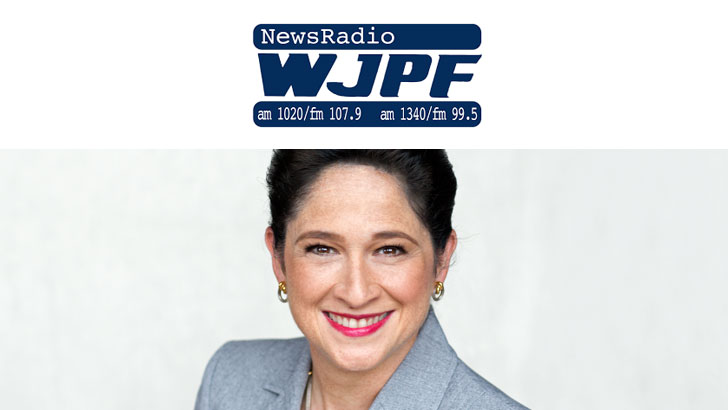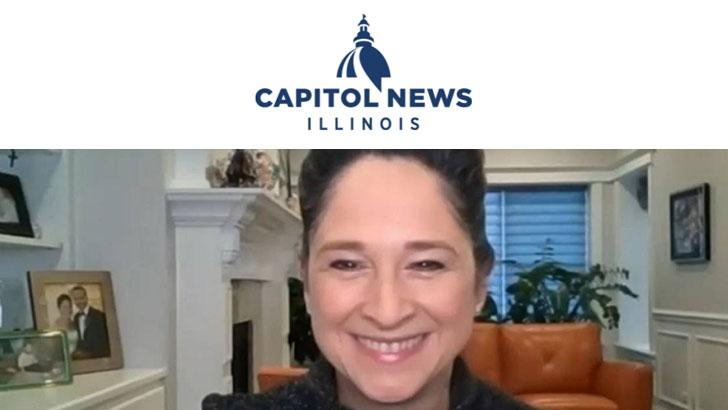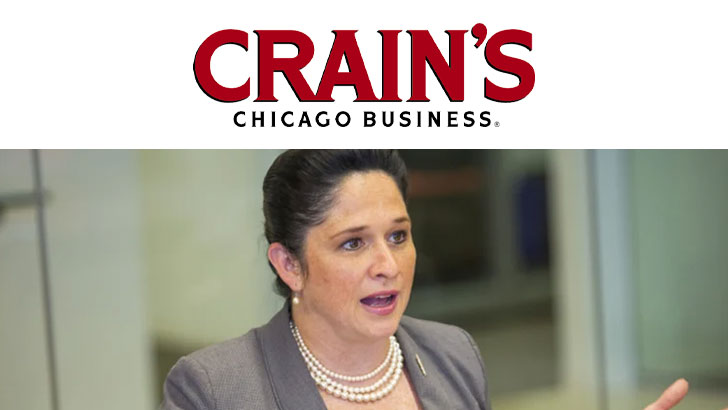Illinois Comptroller Calls For Fiscal Discipline To Maintain Reduced Bill Backlog [AUDIO]

Editorial: Smaller backlog is welcome news
May 9, 2021
Comptrollerãs ãno exit bonus, no signing bonusã reform passes in legislatureãs ethics package
June 1, 2021— NPR Illinois | Cantu, D. —
Illinois has reduced its bill backlog to just under $4 billion ã a far cry from the nearly $17 billion high seen just after the stateãs two-year budget impasse presided over by former Gov. Bruce Rauner.
But the stateãs top financial officer, Comptroller Susana Mendoza, said now is not the time to become complacent.
Despite the reduced bill backlog, Illinois still needs to pay back more than $3 billion the state borrowed from the Federal Reserve last year. Additionally, lawmakers tasked with negotiating the fiscal year 2022 state budget say the state faces at least a $1.4 billion deficit.
Although the state will receive $7.5 billion in federal stimulus money under the American Rescue Plan, Mendoza is cautioning lawmakers to not be in a hurry to spend the whole sum. Instead, sheãs urging them to set aside some of those ARP dollars for Illinoisã severely depleted rainy day fund.
This word of warning takes on new meaning as a recently announced interim rule from the U.S. Treasury Department may prevent state governments from using stimulus dollars to pay back federal loans, though Gov. JB Pritzker this week said he would appeal to the feds.
Mendoza said itãs important for the state to remain committed to passing balanced budgets in order to avoid going back to the days of 11-figure bill backlogs.
According to a projection by the stateãs Commission on Government Forecasting and Accountability, a fiscal watchdog organization, if Illinois continues increasing spending at its five or ten-year average rates of 2.7% and 3.2% respectively, the stateãs bill backlog could skyrocket to over $20 billion by fiscal year 2024.
Mendoza sat down with NPR Illinois this week to discuss the bill backlog, her push for fiscal discipline, and a legislative proposal her office has advocated for to bring more transparency to tax increment financing districts.
* * *
NPR Illinois: A couple of weeks ago, your office reported that the state had reached this milestone, that our bill backlog had gone to just a little over $3 billion. We do have still some billions of dollars in debts or loans that we borrowed from the Federal Reserve, reports are saying that for the FY 22 budget there might be $1.4 billion in a deficit, and of course, the graduated income tax did not pass last year. So…is this just a temporary reprieve that we have right now?
Mendoza: I walked into an office under what seemed like impossible circumstances and I am very happy and proud to report that we are in a situation today for the first time in many years, where Illinois is able to pay all of its commercial vouchers within a couple of days. We’re not even at a 30-day cycle right now. We’ve gotten it down to within a few days, if not a day, of paying our billsãÎ.The important thing is that our new governor needs to champion a balanced budget coming into this next session. He, I think, has tried to do his best so far and has done a really good job. But, we have to remember that if we don’t get balanced budgets year after year, at least try our best to do that, the reality is that the fate of the bill backlog rests entirely, I would say, right now, since we have it under control right now, on whether or not we introduce and pass balanced budgets moving forwardãÎ.We can’t go back to the days of introducing budgets that are wildly out of balance, that have things like the ãGrand Bargainã and working with the Senate as, you know, $3- or $5 billion line items on balancing a budget. Those days are over and we do need to be very transparent with our budget processing and just show taxpayers that we’re taking seriously the issue of being fiscally responsible and looking out for their tax dollars.
NPR Illinois: A couple of months ago COGFA released a report and one of the scenarios that they projected was if the state were to continue doing their five year average of spending increases of about 2.7%, they projected by 2024, FY 2024, the bill backlog might go back up to $19 billion…How realistic is that scenario?
Mendoza: You’ve heard the governor present about $900 million worth of tax cuts on the incentives to large corporations. And I know there’s a lot of pushback on that, but the reality is that the corporations that he’s targeting with those tax cuts fared incredibly well during the pandemic. I mean, this pandemic didn’t affect everybody equally, right? The people who could least afford it took a massive hit…So, if they look at a projected revenue deficit of $1.4 billion, I mean right there, you could have $900 million that helps balance that out.
And so they’re going to have to look at all areas. Nothing is, I guess, sacrosanct.
But I would say that where they can’t afford to cut is in the areas that I’ve been prioritizing as comptroller and thatãs human services, social services, the people who are fighting on the front lines of trying to keep people in their homes and healthy.
And one thing we haven’t even begun to talk about is what the financial fallout is going to be long term when it comes to health care from the pandemic…I spent so much money on paying health care bills, I am fearful of what lies ahead. So we have to approach every budget season moving forward, when you see new revenues, not automatically think about how you’re going to spend them. But how about we start talking about putting money away for a rainy day fund? We have less than 30 seconds worth of money expenditures for daily operations in our rainy day fund right nowãÎ
We haven’t had, and I would say this in both parties, enough fiscal discipline. And I do think that that doesn’t mean not paying for the things that we need, like again, more money for education or for social services, but it’s less money on wasteful things that arenãt really moving the needle on improving people’s lives.
NPR Illinois: Just last week, Gov. Pritzker announced that he is actually committing to funding the $350 million for Evidence Based Model funding for FY 22. Can we afford that? [Editorãs note: Pritzker in February had proposed skipping the $350 million in enhanced school funding for a second year in a row, citing promised federal funding for schools would make up for the lack of year-over-year funds laid out in a 2017 law meant to get poor school districts to parity with wealthy districts over a decade.] And do you also believe that Illinois will be on track of hitting this goal that was previously put out that all school districts would hit 90% of their adequacy targets by 2027? Are we on track to hit that?
Mendoza: So I don’t know if we’re on track for that, I don’t want to say one way or the other. Honestly, I don’t want to give you an opinion without having seen all the data and the estimates right now on that. But what I will tell you is that we will meet that obligation for that $350 million for education.
Illinois is one of the states that chronically under-invests in our state education system. And so when I talk about making the best use of a dollar and having the best return on investment on that dollar, you’re always going to do well if you invest in education in the state. And education is one of those things that over the long term creates a massive return on investment for our stateãÎ
Once Illinois actually meets its obligation of properly funding education, then those are the days that we start to see a less of a reliance on property taxes. Because right now, why are people’s property taxes so high? You know, the state of Illinois isn’t the one that sets your property tax rates. And I think a lot of people mistakenly believe that we’re the ones who say what your property taxes should be, but that’s not the case. It’s the local municipalities that set your property tax levies. And the problem is that they have to keep going back to that well because the state is not meeting its obligation of properly funding schools. The day we do that, you’re going to start to see people no longer need to rely on property tax increases.
NPR Illinois: Your office has one initiative, House Bill 571, which would call for municipalities…to report more details about tax increment financing districts. Could you just first tell me a little bit about what that bill would accomplish? And also because such a big portion of education dollars are wrapped up in property taxes, do you believe that school districts should have a say on whether a TIF is created in their district or whether or not their dollars should be allocated to go towards a TIF, especially since not all TIFs, you know, lead to a return on investment?
Mendoza: Well, look, I feel that transparency has been the hallmark of my administration, and I think that it’s also the road to restoring trust in government. When people believe that all of the decisions related to their school district or in any environment, right, are done behind closed doors without input by the people that are actually toiling away at this endeavor, it creates distrust and animosity towards the process…What happens is that all of these dollars are being generated and districts are missing out on money because it’s going to investments on potential job creation or economic development. But we’ve also seen that a lot of, they’re supposed to be going to blighted areas, and a lot of these TIF dollars are not in what we would consider by any stretch of the imagination blighted areas.
The other issue with the TIFs is that, interestingly enough, the developers are the ones who choose the consultants who determine whether or not this TIF is meeting its expected goals or deliverables in a return on investment for those tax dollars. Which is an inherent conflict of interest…So, we decided to at the very least, as part of our big reform here, is that the city would be responsible for choosing their consultant because they want somebody who will advocate for the city’s position here, not the developerãs position in this deal. Of course, the consultantãs always going to say, ãThis is going to pay off great in 10 years,ã and it usually never does, right? So moving forward, these TIFs will have a lot more transparency and they’re going to have to report to my office whether or not they’ve met their deliverables and what their expectations are for meeting them, their timeline, and most importantly the city will now have a vested interest in choosing a consultant that will make sure that these deliverables are legitimate. And then that gives the constituency a much greater voice.
Stay up to date
Sign up to be a part of Team Susana today! You will receive notifications on activities, announcements and more.





